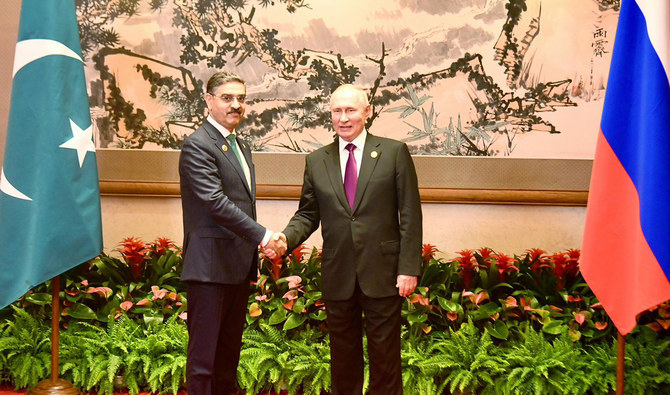ISLAMABAD: The potential for economic cooperation with Pakistan was “much higher, much bigger” than at present and both nations would discuss steps to enhance ties, Russian President Vladimir Putin said in a meeting with Pakistani Prime Minister Anwaar-ul-Haq Kakar in Beijing, where the two leaders are attending the Belt and Road Forum.
Pakistan and Russia have recently moved to improve ties, with Islamabad receiving first deliveries of Russian crude under a deal struck between the two countries earlier this year. Last month, Pakistan also received its first shipment of liquified petroleum gas from Moscow.
“The trade between our countries has increased and it has reached good levels,” Putin told Kakar on the sidelines of the forum, as the two leaders sat across from each other.
“Our potential of economic cooperation, our potential is much higher, much bigger and we are going to discuss that … I hope we will be able to listen to your colleagues as well and we will exchange our visions of how and what additional steps could be taken to enhance our cooperation in all areas.”
Kakar told Russian president Islamabad and Moscow had a convergence of interests, particularly on the issue of terrorism, which deserved a more “regional and common approach.”
“I think we are the first who would have [face] the implications [of terrrism] so we should be the foremost to take the initiative,” Kakar said, adding that both countries should increase coordination and cooperation in defense, intelligence, and counter-terrorism.
Kakar told Putin Pakistan was a “huge market” for Russia as an energy-deficient country with a population of 240 million people.
Kakar arrived in Beijing on Monday to attend the Belt and Road Forum, which marks the 10th anniversary of the Belt and Road Initiative (BRI) championed by President Xi Jinping. Prior to his meeting with Putin, Kakar met the presidents of Sri Lanka and Kenya in sideline meetings, as well as other world leaders during a dinner hosted by the Chinese president at the Great Hall of the People.
The BRI is a plan for global infrastructure and energy networks that China launched a decade ago to connect Asia with Africa and Europe through land and maritime routes. But critics see the plan — billed as recreating the ancient Silk Road to boost global trade — as a tool for China to spread its geopolitical and economic influence.
Under the BRI, Beijing has pledged over $60 billion for energy, infrastructure and other projects in Pakistan.



















